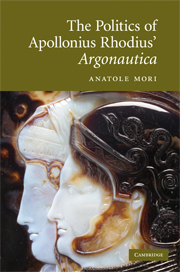Book contents
- Frontmatter
- Contents
- List of tables
- Acknowledgments
- List of abbreviations
- 1 Introduction
- 2 The politics of Alexandrian poetry
- 3 Strife and restraint among the Argonauts
- 4 Sexual politics in Lemnos, Colchis, and Drepane
- 5 Piety, mediation, and the favor of the gods
- 6 The bones of Apsyrtus
- 7 Quid denique restat: Apollonius and Virgil
- Bibliography
- Index
4 - Sexual politics in Lemnos, Colchis, and Drepane
Published online by Cambridge University Press: 22 September 2009
- Frontmatter
- Contents
- List of tables
- Acknowledgments
- List of abbreviations
- 1 Introduction
- 2 The politics of Alexandrian poetry
- 3 Strife and restraint among the Argonauts
- 4 Sexual politics in Lemnos, Colchis, and Drepane
- 5 Piety, mediation, and the favor of the gods
- 6 The bones of Apsyrtus
- 7 Quid denique restat: Apollonius and Virgil
- Bibliography
- Index
Summary
Royal women in Hellenistic politics
Much of Argonautica 3 is dedicated to the complexities of Medea's psyche, and the combination of passionate vulnerability and arcane knowledge that makes her not only the most fascinating character of the poem, but probably the most significant as well. As Byre observes, “By giving us intimate access to the inner world of Medea, Apollonius makes us care, and care very deeply, about her and about what happens to her.” Modeled in part on Homer's Circe, Medea is a priestess of Hecate and skilled in magic, and her characterization also recalls aspects of Nausicaa, Penelope, and Helen. Book 3 begins as Hera and Athena conspire with Aphrodite to make Medea fall in love with Jason, so that he and the other Argonauts may return home with the Golden Fleece. Jason's reliance on Medea is by no means unparalleled in the Iliad and Odyssey, but critical events in these poems emphasize the self-reliance of heroes like Achilles and Odysseus, regardless of the help they receive. By contrast, the consequences of female aid are of central concern in several Argonautic episodes, all of which demonstrate that a man who accepts such help is not dishonored, and that the woman who offers it merits public honors and recognition.
Medea's prominence has traditionally been seen as an aetiological prehistory of the events portrayed in Euripides’ tragic Medea, a work that pits a strong heroine against a weak and treacherous husband.
- Type
- Chapter
- Information
- The Politics of Apollonius Rhodius' Argonautica , pp. 91 - 139Publisher: Cambridge University PressPrint publication year: 2008



